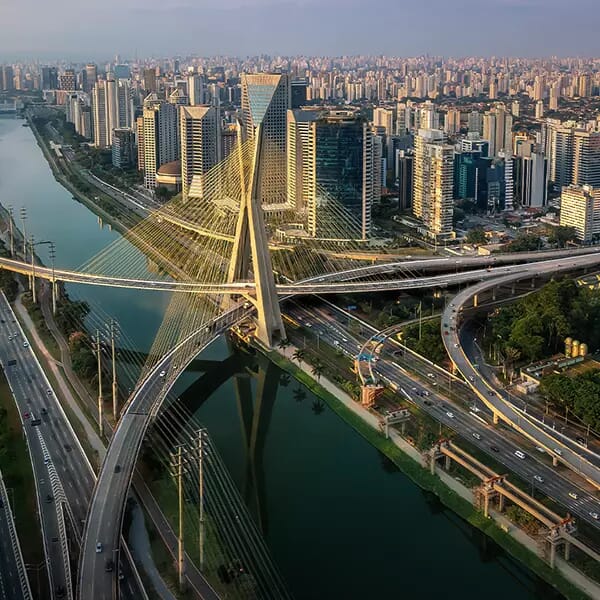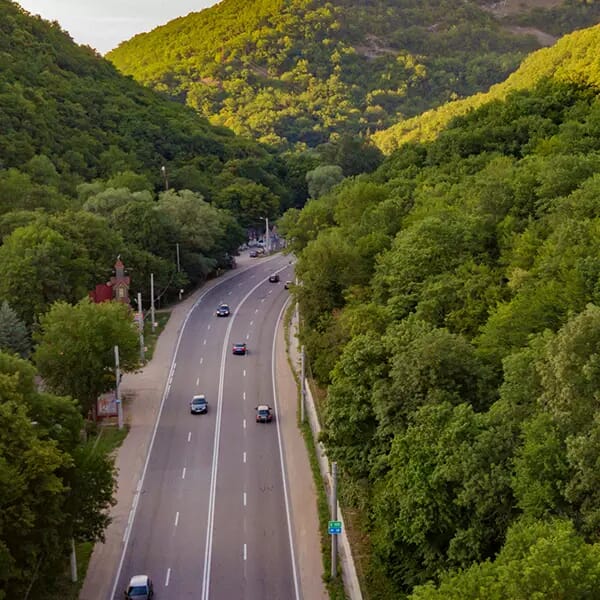 GRI Club - Flavio Guarnieri
GRI Club - Flavio GuarnieriInfra Brazil GRI plans future of Brazilian infrastructure
Highlights included the presence of Gustavo Montezano (BNDES) and Eduardo Leite (Government of Rio Grande do Sul).
Infra Brazil GRI reached its fifth edition in 2019, consolidating itself as the great meeting point of the main infrastructure and energy industry players – such as the CCR Group, Neoenergia, BRK Ambiental and GIC – and of representatives of national and subnational entities, in a transformative dialogue dedicated to the evolution of this market. Program highlights included the presence of Gustavo Montezano, president of the Brazilian Development Bank (National Bank for Economic and Social Development/BNDES) and of governor Eduardo Leite (Rio Grande do Sul).
Held on October 30 and 31 at São Paulo Corporate Towers’ Convention Center, the event provided an environment for exchanging ideas and identifying potential business, in a year marked by the start of Jair Bolsonaro’s new federal administration and by a sharp drop in public participation as a driver of the infrastructure sector. In this context, Infra Brazil had broad participation of public and private leaders, with more than 310 participants.
Regulation and transparency
Prior to the official opening of the event, a special session addressed the performance of the control bodies and the development of the infrastructure industry in the country, with special guests Júlio Marcelo de Oliveira (Public Prosecutor at the Federal Court of Accounts – MP/TCU), Marlos Moreira dos Santos (General Comptroller of the Union – CGU) and Nicola Espinheira da Costa Khoury (TCU). Moderation was by Mauro Viegas Neto (Concremat Engenharia e Tecnologia).
This panel discussed the mission of control bodies in sector operations, including public-private partnerships (PPPs) and concessions, and recalled the increased participation of such bodies over the past few years, especially through public asset divestments and privatizations.
Other topics covered were the need for prior advice and for maintaining control actions to promote new investments. Topics the business community considered critical include the slow pace of the processes. Regulators, in turn, pointed out developments in recent activities moving towards greater transparency, market control and surveillance, and contracts, as well as their impact in reducing the time taken for analysis.
BNDES repositioning
The conference was then officially started with the participation of Gustavo Montezano, president of the BNDES, as keynote speaker.
Mediated by Eduardo Camargo, president of CCR Lam Vias, Montezano took stock of his management so far and addressed the funding organization’s repositioning. After being asked, he addressed recent changes that were made at the banking institution, its role in structuring projects and providing technical support to federation entities, and the objectives of his administration.
State projects
The main projects of the states of Rio Grande do Sul and of Minas Gerais were also on the agenda, attended by Rio Grande do Sul governor Eduardo Leite and by Minas Gerais’ secretary of Infrastructure and Mobility, Marco Aurélio Barcelos. Fabio Abrahão, Infrastructure director at BNDES, completed the panel, which was moderated by Julyana Yokota, senior director at S&P Global’s Infra Ratings Latam.
Leite said he was convinced that the PPP model is key to enabling infrastructure with a long-term view, and stressed the importance of legitimizing privatization agendas in the electoral process. Barcelos highlighted the need to make sure that the public partnership and concession policy becomes a State, not government matter, with continuity, and listed Minas Gerais’ priorities for private enterprise concession in the near future. Abrahão, meanwhile, remarked on the work BNDES has been doing in support of subnational entities.
Communication to generate results
To start the second day of intense debates about the future of the Brazilian infrastructure sector, GRI Club Infra brought a panel on the importance of internal communication in companies to promote employee engagement with the strategy and drive results. Discussions were led by Adevani Rotter, president and founder of Ação Integrada.
Energy planning
In the sequence, a panel with Reive Barros, secretary of Energy Planning and Development at the Ministry of Mines and Energy, moderated by André Clark, president and CEO of Siemens Brazil, focused on key aspects of energy planning, given the country's growth expectations. The secretary, who represented minister Bento Albuquerque, stressed the need to diversify the energy matrix and spoke about issues that are priorities to the sector, such as the promotion of the gas and nuclear energy markets.
In this context, he also took up the discussion on important challenges, such as the search for efficient alternatives and legislative adjustments and the introduction of the energy security concept, a cost to be paid by all – regulated and free markets.
Dialogue that transforms
Over the two days of the program, Infra Brazil GRI 2019 participants reviewed more than 20 key topics for industry development. Among the points raised were the encouragement of a more stable environment, through greater legal certainty and transparency in public-private relations, factors necessary to unlock contributions in key areas.
On the first day of the event, there were important discussions on concession renegotiations and returns; credit mechanisms for infrastructure; the new model of the electric energy sector; changes and advances brought by the new bidding act, as well as its impact on the public-private partnership and concession acts; prospects in privatization; the natural gas market, and the potential of the port sector, among other topics.
On the second day, issues such as regulatory agency assignments and the next steps for road concessions caught the participants’ attention. The new legal framework for PPPs and bidding generated interest among those present, as did the direction to be taken by electric mobility.
The infrastructure credit room, one of the most crowded, discussed challenges in a BNDES repositioning scenario, with the understanding that resources should come from a combination of sources – capital markets, banks, and multilateral agencies. It also addressed the relevance of advances in risk mitigation mechanisms, with the important role insurers play on several fronts, but still lacking effective solutions regarding exchange rate risk. Complementary to that, the discussion focused on debentures, exchange hedging, and green bonds revealed a view that there should be no shortage of resources for good projects, but that the infrastructure credit market still has a lot to progress and that there is an essential need for the entry of institutional investors and for increased foreign presence.
One of the most heated debates addressed friendly returns and rebidding for concessions, possible from Decree No. 9957/2019. Among other points, the urgency of a solution for past cases and the need for fast action to prevent future incidents were defended. To participating players, one factor that still raises doubts concerns compensation. The importance of balancing the risk matrix among those involved in a contract was also urged.
The future of the airport sector was on the agenda as well. The progress of the sixth round of terminal concessions dominated part of the debate on the theme, which also addressed innovations applied to the pre-event stage and the prospect of improvements in the future phase. Among industry demands cited were the inclusion of a clause on property tax collection and the need for a prompt response to avoid the consolidation of case law regarding such disputes.
Sanitation legal framework
Part of an intense agenda and considered a priority theme for the Executive and Legislative, the basic sanitation legal framework was a recurring issue during Infra Brazil GRI 2019. In total, three discussions crisscrossed the theme.
Held shortly after the special committee that reviews the segment regulation update approved the report of representative Geninho Zuliani (DEM-SP) on bill No. 3261/19, authored by senator Tasso Jereissati (PSDB-CE), the debates attracted a lot of participation. The general view is that sanitation has indeed entered Brazil’s public agenda, and that the time is right for the final approval of the bill, ensuring more legal certainty for this market, which has much to evolve. A long way ahead was also pointed out in the room focused specifically on solid waste, where it was argued that the segment be viewed as a utility and as a source of resources – not garbage – and that it be the object of well-structured public policies.
At the regulatory level, in a year marked by a new act (no. 13,848/2019), the challenges facing the new scenario and the transformations that demand greater oversight and control were the subject of a discussion about the duties of regulatory agencies and the conditions to fulfill them. The lack of human resources, of a career, and of a way to equate the need for agility and for legal certainty were issues that gained space in the dialogue, with the participation of officials from Brazilian entities – the National Water Agency (ANA), the National Land Transportation Agency (ANTT), the National Civil Aviation Agency (Anac), and the National Electric Energy Agency (Aneel).
Attended by representative Arnaldo Jardim (Cidadania-SP), the debate on the new bidding act and its impacts on the bill aimed at updating public-private partnerships and concessions, which is being updated in Congress, was also a highlight of the event’s debate agenda. The analysis of tripartite agreements and other aspects, such as risk sharing, is expected to appear in the project under discussion.
Attending this edition of Infra Brazil GRI were names such as Teresa Vernaglia (BRK Ambiental), Bernardo Serafim (Vinci Concessions), Jose Bartolomeu (Roadis), Guilherme Caixeta (GIC), Bruno Sena (BMPI), Matheus Villares (Temasek Holdings), Andre Dorf (Arteris), Celso Pedroso (Solví Participações), Raphael Gloria (Equinor), Wilson Ferreira Jr. (Eletrobras), Thiago Barral (Energy Research Office/EPE), and Jaime Holguín (Latin American Development Bank/CAF).
Note from the newsroom: article updated 11/4.



